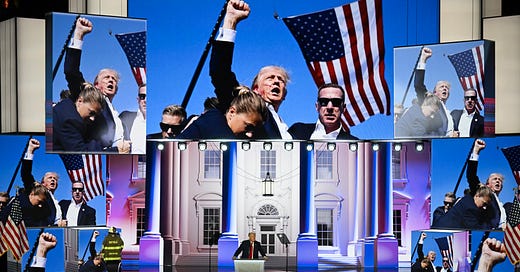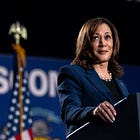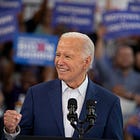How the press helped Trump sell himself as a strongman
The line between news reporting and MAGA propaganda became disturbingly blurry.

PN is a reader-supported publication made possible by paid subscribers. Appreciate our independent journalism? Then please sign up to support us.
Between President Biden announcing he’s stepping aside, his endorsement of VP Kamala Harris, the Democratic Party turning the presidential race on its head by quickly rallying around her, and JD Vance immediately crashing and burning as Trump’s VP pick, this week has been a historic one in American politics — so much so that last week’s RNC feels like a distant memory.
But it’s worth devoting some attention to how the press did Trump’s work for him by portraying the aspiring authoritarian exactly how he wants to be seen — as a heroic strongman and newfound champion of political unity.
Trump accepted the Republican presidential nomination for a third time on July 17 with a rambling, incoherent mess of a speech that offered a terrifying vision for America during its rare moments of coherence. His performance was widely regarded as a disaster. But a range of major newspapers didn’t cover it that way.
More than a few headlines actually raved about it. The Boston Globe: “In a departure, Trump calls for unity, healing in America.” The Atlanta Journal-Constitution: “Trump urges unity after assassination attempt while proposing sweeping populist agenda.” Baltimore Sun: “Subdued Trump describes assassination try, accepts nomination.”
As media critic Parker Molloy pointed out, these papers seemingly reported on Trump’s speech based on the prepared remarks, not the speech as he actually delivered it.
In reality, Trump’s RNC coronation was a collective failure of our justice system, political process, and a mainstream media ecosystem that has consistently failed to hold him accountable. He still faces a tough challenge to win this election — especially now that Harris is on the top of the ticket — but he got a significant propaganda boost from a credulous, optics-obsessed press.
Trump will never pivot to unity because his whole brand is divisiveness
Not long after Trump’s attempted assassination at a Pennsylvania rally on July 13, mainstream outlets went along with the Trump campaign’s narrative: The shocking event had changed him for the better.
When Trump made his first appearance at the RNC on July 15, the New York Times described him as “subdued” and claimed he showed a “glimpse of vulnerability.” But Trump had already demonstrated he was unchanged earlier that day when he posted on Truth Social that his idea of “Uniting our Nation” was the dismissal of all criminal charges against him.

Trump spewed his usual invective against his political foes throughout the week. The media, nonetheless, continued to take seriously the idea that he was a new man.
Axios reported on July 15 that Trump “plans to seize the his moment by toning down his Trumpiness” and MSNBC’s Katy Tur described his first appearance at the RNC as “serene.” But the most egregious instance of this genre was a piece from Politico’s Natalie Allison, who wrote on July 17 that “there appears to be a new softness to Donald Trump, with people who’ve talked to him describing him with words like ‘existential,’ ‘serene,’ ‘emotional’ and even ‘spiritual.’”

None of those words rightly apply to the man who has made shouting out fictional cannibal Hannibal Lecter a staple of his speeches (including at the RNC).
To be fair, the photo of Trump taken just after the assassination attempt — the one showing him bloodied with his fist in the air and the American flag in the background — is impressive. Donald Trump Jr. shared it on social media just minutes after the shooting and wrote, “He'll never stop fighting to Save America.”
That’s not a surprising sentiment coming from the former president’s eldest son, but similar framing was repeated over and over in the mainstream press. Meet the Press host Kristen Welker described the image as “defiant [with] that traditional fist-pump that Donald Trump is known for.” Politico’s headline blared, “Trump’s Raised Fist Will Make History — And Define His Candidacy.” The Daily Beast’s read “Trump Just Created One of the Most Iconic Photos in US History,” with the ensuing piece gushing that Trump’s reaction to the shooting “was a stunning testament to the fighting spirit that half the country loves.”
These are subjective interpretations of a horrific event presented as objective reality within news articles, not op-ed columns. (The Washington Post at least ran Philip Kennicott’s “A powerful photograph that could change America forever” in the Style section, but that’s still a curious way to cover an assassination attempt on a presidential candidate.)
Largely left out of the coverage of the assassination attempt on Trump is the fact he not only has glorified political violence in the past but continues to do so — one of his central campaign promises is to pardon January 6 insurrectionists convicted of crimes. And he also wants to make it easier for people to obtain weapons of war like the one that shot at him and killed a man in the process.
MAGA propaganda under the guise of news reporting
Another consistent theme in mainstream coverage has been the idea that the rally shooting “changed everything” and tipped the election in Trump’s favor.
Kennicott confidently stated that photo of a bloodied Trump pumping his fist will have an “impact on the fate of American politics” that “probably transcends the infamous 1988 image of then-candidate Michael Dukakis in a tank.” Politico’s Jonathan Martin, meanwhile, wrote that “the pictures and film of Trump rallying the crowd will likely be the enduring image of this election and perhaps his entire political career.” Passages like these predict a future that the writers of them are actively influencing, and in fact Trump’s polling hasn’t moved much since the shooting — which makes sense since a majority of the country decided long ago that they don’t like him.
A note from Aaron: Working with brilliant contributors like Stephen takes resources. To support our independent journalism, please click below and become a paid subscriber if you aren’t one already.
A particularly irresponsible New York Times headline proclaimed, “Amid the Mayhem, Trump Pumped His Fist and Revealed His Instincts.” The sub-headline reads, “A bloodied Donald J. Trump made Secret Service agents wait while he expressed his defiance. The moment epitomized his visceral connection with his supporters, and his mastery of the modern media age.”
This was more fawning than a Jesse Watters monologue on Fox News, and it got worse: Reporter Shawn McCreesh described how Trump told the Secret Service agents to “Wait, wait, wait, wait … his voice a harried — but startlingly clear — command. Reluctantly, they halted. He peered out into the crowd. And then his arm reached toward the sky, and he began punching the air.” It’s like the screenplay from a movie starring Clint Eastwood, who McCreesh actually cites as an inspiration for Trump’s public persona.
Politico’s Martin predicted that last week’s RNC would offer “Trump a hero’s welcome and an audience to match, befitting a party leader who had a brush with death.” However, Martin ignores the larger irony — Trump’s previous running mate, former Vice President Mike Pence, was the target and nearly the victim of political violence on January 6. An angry mob chanted “hang Mike Pence” and a makeshift gallows was erected outside the Capitol, perhaps for that very purpose. The mob came within 40 feet of Pence, who spent nearly five hours in an underground loading dock, during which time Trump expressed zero concern for his safety. Instead, he called him a “wimp” and reportedly agreed with the mob’s murderous chant.
Coverage of the convention mostly ignored Pence as if he were a cast member from a long-running drama who was replaced and quickly forgotten. Yet, in a party committed to democracy instead of a personality cult, Pence would have a prime speaking slot and receive the hero’s welcome that Trump usurped. It’s not surprising that the January 6 Capitol attack was barely mentioned throughout the week, but it gives the lie to Republicans denouncing political violence. They make peace with it when their people do it.
Platforming Republicans is irresponsible unless you’re willing to call them out
The coup plotters who tried to overthrow democracy after the most recent presidential election are now trying to retake power democratically. This is not normal, and responsible journalism shouldn’t enable their revisionist history.
MAGA Republicans were given a platform by CNN and MSNBC all week last week, which is somewhat understandable during the RNC. Less comprehensible, however, is how much lying those Republicans were able to do on networks that not long ago prided themselves on fact-checking.
Eric Trump, for instance, was given a platform on CNN to spread conspiracy theories about how “they” tried to assassinate his father. There was no follow up pressing him on the reality that the shooter was a registered Republican. (Watch below.)
The day after the RNC ended, Eric — who also enjoyed a soft focus interview during the convention with MSNBC’s Katy Tur — gushed to Maria Bartiromo about how well those TV hits went for him.
"I've never been treated with such respect,” he said.
Suffice it to say that if you’re a journalist and a member of the Trump family is praising your coverage of them, something has gone horribly off the rails.
That’s it for this week
We’ll be back with more Monday. If you appreciate this edition, please support Public Notice by signing up. Paid subscribers make this newsletter possible.
Thanks for reading, and have a great weekend.









In the On Politics op-ed this a.m., NYT columnist Jess Bidgood wrote that Democrats have gone from "meh to less meh," pulled out a (one) poll that had Trump only one point ahead of Harris.... To be fair, she cites several instances of voters feeling optimistic. But to characterize the massive outpouring of support for Harris as "less meh" is, to my mind, a continuation of the NYT trying to shape public perceptions in unhelpful ways.
The media are complicit for sure.